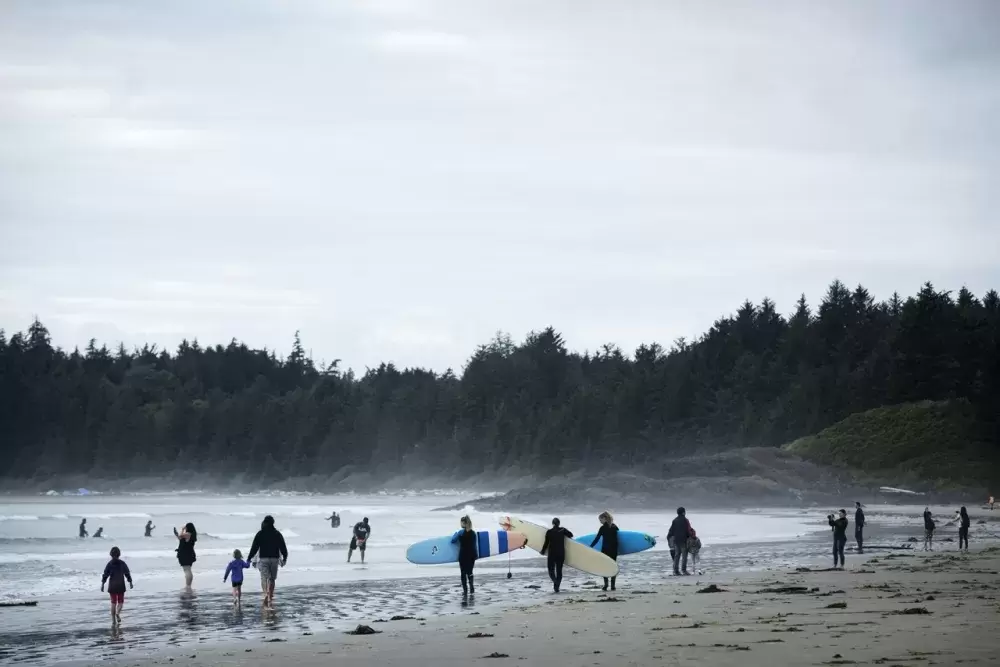As the province of B.C. transitions into Phase 3 of its restart plan, Tla-o-qui-aht First Nation and Tofino welcomed the return of visitors on Vancouver Island’s west coast in a recent press release.
The message differed from a Nuu-chah-nulth Tribal Council (NTC) statement issued in June, which pledged to support the restriction of travel within its nation’s territories until adequate COVID-19 safety measures are met.
NTC asked for COVID-19 information sharing to ensure early reporting of suspected and confirmed cases, screening of non-residents, rapid testing and culturally-safe contact tracing.
“The Premier cannot forget our free, prior and informed consent over our territories, and that we have not given our consent to open up the province,” said Judith Sayers, president of the Nuu-chah-nulth Tribal Council, in the release. “We will do what we need to in order to protect our people, and if there is an impasse, we need to talk. For us, it is people before economics.”
Elmer Frank, Tla-o-qui-aht First Nation emergency operations centre chairperson, said that the joint message from his nation and Tofino shouldn’t be taken as a dispute of the NTC statement on visitors coming to Nuu-chah-nulth territory.
“It isn’t to say that what they’re doing is wrong either,” said Frank. “It was just two meetings, in two different rooms with two different results.”
Tla-o-qui-aht is in close contact with the municipality, along with Parks Canada, and is involved in deciding what opens and what remains closed within their territory, said Frank.
With support from the Pacific Rim National Park, access to Schooner Cove on the north end of Long beach has been restricted. Tla-o-qui-aht First Nation has hired community guardians to patrol the beach to ensure no tourists get through, said Frank.
Tofino Mayor Josie Osborne said that the municipality is very open to supporting Tla-o-qui-aht in their conversations with local hospital staff, Island Health and with the province in any way they can.
“Our conversations with Tla-o-qui-aht are separate from the conversations we’ve had with Ahousaht or with Hesquiaht First Nation,” said Osborne. “Coming to an understanding and an agreement about what each nation wants to do with its own communities and its own territories has been an important part of the way we’ve tried to move forward.”
To make sure that all lines of communication are open, Ms. Osborne reached out to Scott Fraser, MLA for Alberni-Pacific Rim, about the release from NTC.
“I understand where [the NTC is] coming from and I definitely acknowledge the concerns that they expressed around contact tracing, screening, testing and communications,” said Osborne. “It’s largely a conversation that the nations are asking to have with the province and the federal government.”
Laura McDonald, president of The Tofino-Long Beach Chamber of Commerce, said that the chamber is not responsible for testing, or other aspects of health care.
“We have been focused on ensuring the various sectors of our business community have support - both from us and from their colleagues - in implementing the WorkSafe BC guidelines around physical distancing and personal protective controls to ensure we are all preventing the spread of COVID-19,” said McDonald.
Tla-o-qui-aht holds stakes in the tourism industry in Tofino through its ownership of the Best Western Tin Wis Resort.
While Frank acknowledged that it “somewhat” factored into their decision-making, he was quick to add that “If a [COVID-19] case comes to Tofino and it becomes an alarming thing for our community, we certainly would say, ‘we’re going back to lock down and we’re going to have to ask everyone to come back another time’.”







